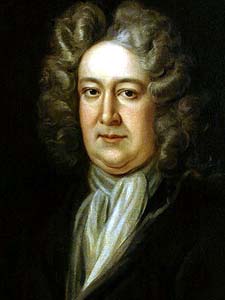Nicholas Rowe

Nicholas Rowe
Nicholas Rowe was poet laureate from 1715 until his death in 1718 at the age of 44. His father, John was barrister and possessed large estates around Lamberton in Devon. Nicholas was born in 1674 and entered MiddleTemple in 1691, a year before the death of his father. This death left Nicholas both rich and master of his own fate. He abandoned the law and took to writing poetry and, later, plays.
He was under-secretary to the Duke of Queensbury from 1709 to 1711 when the Duke acted as Secretary of State for Scotland. When George I came to the throne in 1714 he was made Surveyor of Customs. In the year of his death he became clerk of the presentations in Chancery, showing that he did not entirely turn his back on law. He was most famous for translating the Pharsalia of the Roman poet Lucan (Marcus Annaeus Lucanus - 39-65AD). Nicholas Rowe is buried at Poet's Corner in Westminster Abbey.
He wrote a number of collections of verse as well as six plays: The Ambitious Stepmother (1700); Tamerlane (1702); The Biter (1705); Ulysses (1705); The Royal Convert (1707) and Lady Jane Grey (1715). He also translated and adapted the works of others.
Rowe was certainly born in Little Barford, his doctor and friend James Wellwood wrote in a preface to Rowe's Pharsalia that he was: "born in Little Barford in Bedfordshire, at the House of Jasper Edwards, Esq.; his Mother's father, in the year 1673, of an Ancient Family in Devonshire".
![Little Barford in 1840 [MAT2-1]](/CommunityHistories/LittleBarford/LittleBarfordImages/Little Barford in 1840 [MAT2-1]_350x275.jpg)
Little Barford in 1840
Jasper Edwards was Lord of the Manor of Little Barford before alienating it in 1692 to Francis and Sir Walter Saint John. It therefore seems reasonable to suppose that Rowe may have been born in the manor house. The tithe apportionment map for Little Barford of 1840 [MAT2/1 above] shows a moated area north of the church and it seems a reasonable deduction that this was the site of the medieval manor house. Another manor house lay south-west of the church. It was probably built in the 18th century, to judge by surviving visual evidence. The Bedfordshire Historic Environment Record [HER 477] notes that by 1968 it was uninhabited and dilapidated. It was demolished in 1978. The Dower House has since been built on the site. This house was probably too late to be Rowe's birthplace.
Later tradition stated that Rowe had been born in Rowe's Cottages. However, these were simple labourers' cottages. The confusion probably sprang from the cottages being called The Row or something similar. Rowe's Cottages were scheduled for demolition in 1976 but were carefully dismantled and then rebuilt at Glatton in Cambridgeshire the following year.